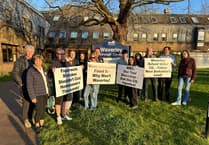A faint rumbling can be heard by people walking through St Bartholomew’s churchyard in Haslemere lately. It is the sound of Sir Robert Hunter turning in his unmarked grave.
Notwithstanding the ongoing scandal at the Post Office, where he was its solicitor from 1882 until his death in 1913, his post-mortem disturbance will have been compounded by the goings on at Waverley and the public inquiry regarding the proposed development at Red Court in Scotland Lane, as reported recently in the Herald.
He was also chairman of Haslemere Parish Council, solicitor to the Commons Preservation Society; and in his spare time he founded the National Trust; certainly a busy man during his 69 years of life.
If you live in Haslemere, or have walked its myriad of footpaths, stood alone and breathed in the alpine air on its hills and commons while taking in their magnificent views, or enjoyed the quiet tranquillity of the streams along its wooded vales, or looked down on the splendour of the Devil’s Punchbowl, everything you see around you is due mostly to his herculean efforts to save these things for us to treasure for ever.
With characteristic modesty, he chose his last resting place to be among his people, in a pauper’s grave in St Bart’s church. This was his town; his home. He certainly knew a thing or two about planners and developers and in 1907, six years before he died, he delivered a speech to Manchester University. Even from the grave, he says it better than any of us:
“If we turn to natural scenery, we find that not even the more striking manifestations of nature are safe from the hand of man. In the exercise of power, in the furtherance of the subjection of nature to his rule, he has often the impatience and thoughtlessness of a child, and will ruthlessly destroy beauty of appearance and association.
“The beauty of hill and vale, wood and water, excites in us, not merely a delight in colour and form, but a subtle sense of the vastness and permanence of the physical world, of the weakness of man, of the late birth of the human race, and of the fleeting character of human life.
“Natural beauty, equally with historic association, stimulates the imagination and takes the beholder out of the petty cares and the small details of every-day existence.
“If the nation is vigilant to save what is interesting and beautiful in its lands and buildings, life will be better worth having for its citizens, not only of to-day, but of centuries to come.”
Mick Bradford
Peperham Road, Haslemere




Comments
This article has no comments yet. Be the first to leave a comment.